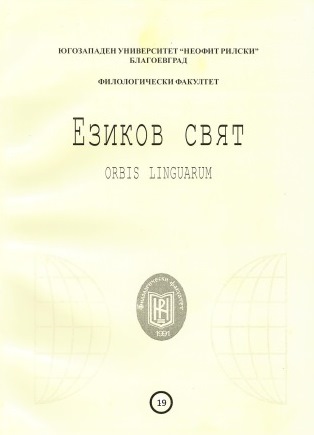ИЗРАЗЯВАНЕТО НА ОБЩО ОТРИЦАНИЕ В БЪЛГАРСКИЯ И НЕМСКИЯ ЕЗИК ПРЕЗ ПРИЗМАТА НА СЪПОСТАВКАТА
THE EXPRESSION OF GENERAL NEGATION IN BULGARIAN AND GERMAN THROUGH THE PERSPECTIVE OF CONTRASTIVE ANALYSIS
Author(s): Krasimira Angelova Chakarova, Radostina KolevaSubject(s): Language and Literature Studies, Theoretical Linguistics, Morphology, Comparative Linguistics
Published by: ЮГОЗАПАДЕН УНИВЕРСИТЕТ »НЕОФИТ РИЛСКИ«
Keywords: negation; general negation; word order; grammaticalization; morphological category
Summary/Abstract: The object of analysis in the present study are some characteristic features of the linguistic means expressing negation (and in particular – general negation) in two unrelated languages – Bulgarian and German. The paper presents a brief outline of the basic concepts of negation as a linguistic phenomenon, and a contrastive study of the specific linguistic means of its verbalization in the two languages, focusing on the cases of interlingual asymmetry. The conclusions are drawn on the basis of rich taxonomic material, excerpted from literary texts translated from German into Bulgarian and from Bulgarian into German. A number of arguments are presented in support of the thesis that in the contemporary Bulgarian language there is a process of grammaticalization of the verbal negation within an independent morphological verbal category, called existential status of the action (result of an action) or a state. In contrast, there is no single formal indicator of negation in German; there are no manifestations of synthetic forms, as for example – the Bulgarian auxiliary verbs няма and недей, and the degree of separability of the negative markers is high. In the final part of the study a conclusion is drawn that the linguistic concepts of general negation and status negation are not identical. The first one is semantic-syntactic and encompasses the cases in which the action of negation refers to the whole sentence. As for the status negation in the Bulgarian language, it means absence (negation) of an action (result of an action) or a state and is expressed morphologically – on the level of the verb word formation.
Journal: Езиков свят - Orbis Linguarum
- Issue Year: 19/2021
- Issue No: 1
- Page Range: 045-055
- Page Count: 11
- Language: Bulgarian

